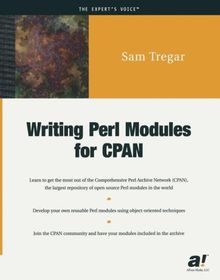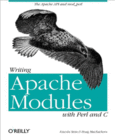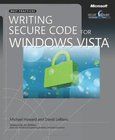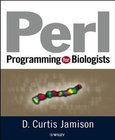Writing Perl Modules for CPAN

Book Details:
| Publisher: | Apress |
| Series: | Apress |
| Author: | Sam Tregar |
| Edition: | 1 |
| ISBN-10: | 159059018X |
| ISBN-13: | 9781590590188 |
| Pages: | 288 |
| Published: | Aug 09 2002 |
| Posted: | Nov 19 2014 |
| Language: | English |
| Book format: | |
| Book size: | 3.45 MB |
Book Description:
Writing Perl Modules for CPAN offers Perl developers a comprehensive guide to using and contributing to the Comprehensive Perl Archive Network (CPAN). Starting with a general overview of CPAN's history, network topology, and navigational mechanisms, the book quickly brings you up-to-speed regarding how to search out and install available modules. However, in the true open source spirit, author and experienced Perl developer Sam Tregar teaches you how to not only use, but also contribute to CPAN via an in-depth discussion of module creation, submission, and maintenance. Beginning with a survey of basic design principles, Tregar takes care to discuss all issues relevant to developers wishing to create great Perl modules, including choosing a proper name, properly using Perl's POD (plain old documentation) feature, concepts surrounding functional and object-oriented API development, and much more. Tregar then proceeds with a complete dissertation of how modules should conform to CPAN module specifications, covering required distribution files and coding considerations, in addition to offering advice regarding proper module testing. After demonstrating how to create a module and prepare it for release, Tregar guides you through the CPAN module submission process and discusses module maintenance once the module has been contributed to the CPAN service. Writing Perl Modules for CPAN is an indispensable guide for anyone wishing to make the most of the CPAN service.
Download Link:
Related Books:
Writing Apache Modules
With Perl and C
Apache is the most popular web server on the Internet because it is free, reliable, and extensible. The availability of the source code and the modular design of Apache makes it possible to extend web server functionality through the Apache API.For the most part, however, the Apache API has only been available to C programmers, and requires rebuilding the Apache server from source. mod_perl, the popular Apache module used primarily for enhanced CGI performance, changed all that by making the Apache API available to Perl programmers. With mod_perl, it becomes simple to develop Apache modules with Perl and install them without having to rebuild the web server.Writing Apache Modules with Perl and C shows how to extend web server capabilities regardless ...
Writing Secure Code for Windows Vista
Get the definitive guide to writing more-secure code for Windows Vistafrom the authors of the award-winning Writing Secure Code, Michael Howard and David LeBlanc. This reference is ideal for developers who understand the fundamentals of Windows programming and APIs. It complements Writing Secure Code, examining the delta between Windows XP and Windows Vista security. You get first-hand insights into design decisions, lessons learned from Windows Vista development, and practical advice for solving real-world security issues.Discover how to: Develop applications to run without administrator privileges Apply best practices for using integrity controls Help protect your applications with ASLR, NX, and SafeSEH Evaluate authentication, authorization, and ...
Perl Programming for Biologists
Working on the assumption that the reader has no formal training in programming, Perl Programming for Biologists demonstrates how Perl is used to solve biological problems. Each chapter opens with a set of learning objectives, provides numerous review questions and self-study exercises, and concludes with a bulleted summary of key points. The author incorporates numerous real-life examples throughout the text. Upon completing the book, readers are able to quickly perform such tasks as correcting recurring errors in spreadsheets, scanning a Fasta sequence for every occurrence of an EcoRI site, adapting other writers' scripts to one's own purposes, and most important, writing reusableand maintainable scripts that spare the rote repetition of code....
2007 - 2021 © eBooks-IT.org



